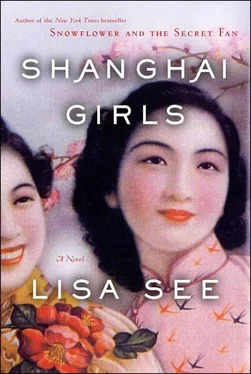I don’t catch the title of May’s first movie, but since she has her own clothes, she gets to play a singsong girl instead of a peasant. She’s gone for three nights and she sleeps during the days, so I don’t hear about her experience until the shoot ends.
“I sat in a fake teahouse all night and nibbled on almond cakes,” she recalls dreamily. “The assistant director called me a cute tomato. Can you imagine?”
For days she calls Joy a cute tomato, which doesn’t make much sense to me. The next time May works as an extra, she comes back with a new phrase: “What in the H,” as in “What in the H did you put in this soup, Pearl?”
Often she comes home bragging about the food she’s eaten. “They give us two meals a day, and it’s good food-American food! I have to be careful, Pearl, truly I do or I’m going to get fat. I won’t fit into a cheongsam then. If I don’t look perfect, they’ll never give me a speaking part.” After that, she takes to dieting-dieting for someone so tiny, for someone who knows what it means not to eat because of war, poverty, and ignorance-before Tom sends her out for a job and then for days afterward to lose the imagined weight she’s gained. All this in hopes that a director will give her a line. Even I know that-except for Anna May Wong and Keye Luke, who plays Charlie Chan’s Number One Son-speaking parts go only to lo fan , who wear yellow makeup, have their eyes taped back, and affect chop-suey English.
In June, Tom comes up with a new idea, May gobbles it and then spits it out to our father-in-law, who embraces it as his own.
“Joy’s a beautiful baby,” Tom tells May. “She’ll make a perfect extra.”
“You can make more money from her than you can from me,” May relays to Old Man Louie.
“Pan-di is lucky for a girl,” the old man confides to me. “She can earn her own way and she’s only a baby.”
I’m not sure I want Joy spending so much time with her auntie, but once Old Man Louie sees he can make money from a baby, well…
“I will let her do it on one condition.” I can make a requirement because, as Joy’s mother, only I can sign the paper allowing her to work all day and sometimes at night under the supervision and care of her aunt. “She will keep everything she makes.”
Old Man Louie doesn’t like this. Why would he?
“You will never again have to buy her clothes,” I press. “You will never again pay for her food. You will never again pay one single penny for this Hope-for-a-Brother.”
The old man smiles at that.
WHEN MAY AND Joy aren’t working, they stay in the apartment with Yen-yen and me. Often, in the long afternoons as we wait for China City to reopen, I think back to stories Mama told me about when she was a girl and confined to the women’s chambers in her natal home with her bound-footed grandmother, mother, aunts, cousins, and sisters. They’d been trapped to maneuver for position, harbor resentments, and snipe at one another. Now, in America, May and Yen-yen fight like turtles in a bucket about anything and everything.
“The jook is too salty,” May might say.
“It isn’t salty enough” comes Yen-yen’s predictable reply.
When May twirls through the main room in a sleeveless dress, stockingless legs, and open-toed sandals, Yen-yen complains, “You shouldn’t be seen in public like that.”
“Women in Los Angeles like bare legs and arms,” May counters.
“But you aren’t a lo fan ,” Yen-yen points out.
But nothing and no one is better to fight over than Joy. If Yen-yen says, “She should wear a sweater,” May responds with “She’s roasting like corn on a fire.” If Yen-yen observes, “She should learn to embroider,” my sister argues back, “She should learn to roller-skate.”
More than anything Yen-yen hates that May works in motion pictures and exposes Joy to such low-class activities, and she blames me for letting it happen.
“Why do you let her take Joy to those places? You want your girl to marry one day, don’t you? You think anyone will want a bride who puts her shadow self in trash stories?”
Before I can say anything-and I’m probably not meant to anyway-my sister comes back with her objection: “They aren’t trash stories. They just aren’t for people like you.”
“The only real stories are the old ones. They tell us how to live.”
“Movies tell us how to live too,” May retorts. “Joy and I help tell stories of heroes and good women that are romantic and new. They aren’t about moon maidens or ghost girls languishing for love.”
“You’re too simple,” Yen-yen chides. “That’s why it’s a good thing you have your sister to look out for you. You need to learn from your jie jie . She understands that those way-back stories have something to teach us.”
“What does Pearl know about it?” May asks, as though I’m not in the room. “She’s as old-fashioned as our mother.”
How can she call me old-fashioned? How can she compare me with Mama? I admit that, in my longing for home, for the past, and for our parents, I’ve become like Mama in many ways. All those old ideas about the zodiac, food, and other traditions give me comfort, but I’m not the only one looking backward for consolation. May is bright, effervescent, and undeniably exquisite at twenty, but her life-even though she gets to go to movie sets and dress up-is not what she envisioned back when we were beautiful girls in Shanghai. We both have our disappointments, but I wish she could show me a little more sympathy.
“If your movies teach you to be romantic, then why is it that your sister, who stays with me every day, has done a much better job at this than you?” Yen-yen asks.
“I’m romantic!” May fights back, haplessly falling into Yen-yen’s trap.
My mother-in-law smiles. “Not romantic enough to bring me a grandson! You should have a baby already…”
I sigh. These kinds of arguments between mother-in-law and daughter-in-law are as old as humankind. With conversations like this, I’m happy that most days May and Joy are on a film set and I’m alone with Yen-yen.
On Tuesdays, after delivering lunch to our husbands in China City, Yen-yen and I go door to door to every boardinghouse, apartment, and business along Spring Street, where people buy their groceries, and even over to New Chinatown to raise money for United China Relief and national salvation. We’ve gone beyond picketing. Now we carry empty vegetable cans and use them as beggars’ bowls, walking down Mei Ling, Gin Ling, and Sun Mun Ways, agreeing that we can’t go home until our cans are at least half full with pennies, nickels, and dimes. People are starving in China, so we also visit groceries and make the owners donate imported Chinese food, which we pack and send back to where it came from: China, home.
Doing this work, I meet people. Everyone wants to know my natal family name and which village I’m from. I meet more Wongs than I can count. I meet lots of Lees, Fongs, Leongs, and Moys. Through it all, Old Man Louie never once complains that I’m traipsing from Chinatown to Chinatown or that I’m meeting strangers day after day, because I’m always with my mother-in-law, who begins to confide in me not as a despised daughter-in-law but as a friend.
“I was kidnapped from my village as a small girl,” she tells me one Tuesday as we walk back from New Chinatown along Broadway. “Did you know that?”
“I didn’t know. I’m sorry,” I say, which doesn’t begin to cover what I feel. I was expelled from my home, but I can’t imagine being taken from it forcibly. “How old were you?”
“How old was I? How can I know? I don’t have anyone to tell me that. Maybe I was five. Maybe I was older, maybe younger. I remember I had a brother and a sister. I remember there were water chestnut trees along the main road to my village. I remember a fishpond, but I guess every village has one of those.” She pauses before going on. “I left China long ago. I long for it every day and suffer when she suffers. That’s why I work so hard to raise money for China Relief.”
Читать дальше












